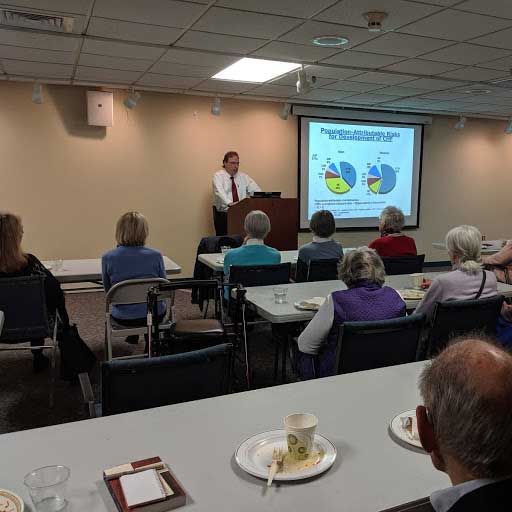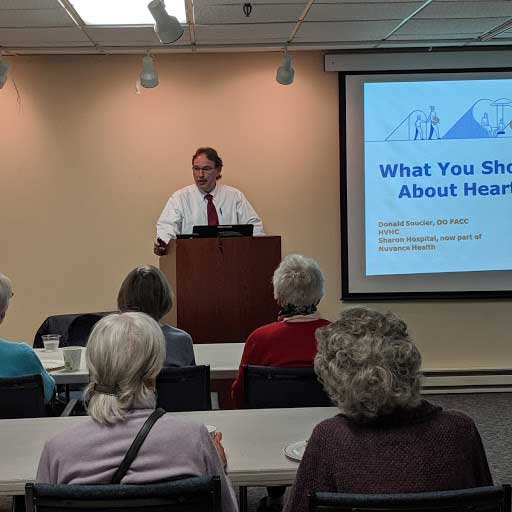Heart Issues at the forefront of discussion at Noble Horizons. The advances in modern technology in the early part of the 21st century have brought with them advances in a number of long-standing fields of institution. In the field of Science and Medicine, technology has helped both researchers and physicians diagnose and combat some of the most deadly diseases in the world. Still, there remain mountains yet to be scaled within the medical community, particularly when it comes to what many consider the most important muscle in our body, the heart. Cardiovascular disease remains the leading cause of death in adults in the United States and, according to the American Heart Association, was responsible for over 840,000 deaths in 2016 alone. Despite being such a pervasive threat, most of what we know about cardiovascular disease, especially how it relates to heart failure, comes from research conducted on middle-aged men. Enter Dr.Donald Soucier from the Heart Center at Sharon Hospital in Sharon, CT. Dr.Soucier earned his medical degree from the Kansas City University of Medicine and Biosciences and has since been in practice for over 35 years. Dr.Soucier’s all-encompassing approach explores the differences in diagnosis and treatment of heart disease between men and women. For Dr.Soucier, the neglected female population is of particular concern when it comes to Cardiovascular disease risk factors including heart failure after a certain age, especially when considering that congestive heart failure accounts for 50% of all heart failure among women.
 On October 18th, Dr.Soucier stopped by Noble Horizons to council the women of the community on this critical health issue. Soucier currently serves as the Director of Cardiology at Regional Health Care in Sharon Hospital and has also spent time during his career at the Department of Internal Medicine in Saint Francis Hospital and Medical Center in Hartford CT where he specialized in Congestive Heart Failure and Echocardiology utilizing diagnostic technology that measures heart rate in waves and other non invasive techniques that assess the pumping of the heart visually to determine the size and location of heart attacks. For the esteemed physician, there are three questions that lie at the core of issues regarding female heart failure, What is heart failure? Why Should I be concerned? What Can I do to prevent Heart Failure? “Misconceptions are one of the most critical aspects of communicating this issue to the public,” said Dr.Soucier Friday afternoon to a packed community room at Noble Horizons, “Heart failure is NOT a heart attack, Heart Failure is a condition that develops after the heart muscle is injured from a number of factors.” there are a number of symptoms that can indicate the possibility of congestive heart failure that aren’t necessarily related to heart attacks including fatigue, chest congestion, swelling ankles, and shortness of breath. There are also a number of factors that can play a part in the onset of congestive heart failure including a heart attack itself, high blood pressure, leaky heart valves, diabetes, obesity, and of course, the abuse of toxins like drugs or alcohol. In the US, 39% of the incidents of heart failure in men come as a result of hypertension, astonishingly, an even greater number of women experience hypertension nationwide.
On October 18th, Dr.Soucier stopped by Noble Horizons to council the women of the community on this critical health issue. Soucier currently serves as the Director of Cardiology at Regional Health Care in Sharon Hospital and has also spent time during his career at the Department of Internal Medicine in Saint Francis Hospital and Medical Center in Hartford CT where he specialized in Congestive Heart Failure and Echocardiology utilizing diagnostic technology that measures heart rate in waves and other non invasive techniques that assess the pumping of the heart visually to determine the size and location of heart attacks. For the esteemed physician, there are three questions that lie at the core of issues regarding female heart failure, What is heart failure? Why Should I be concerned? What Can I do to prevent Heart Failure? “Misconceptions are one of the most critical aspects of communicating this issue to the public,” said Dr.Soucier Friday afternoon to a packed community room at Noble Horizons, “Heart failure is NOT a heart attack, Heart Failure is a condition that develops after the heart muscle is injured from a number of factors.” there are a number of symptoms that can indicate the possibility of congestive heart failure that aren’t necessarily related to heart attacks including fatigue, chest congestion, swelling ankles, and shortness of breath. There are also a number of factors that can play a part in the onset of congestive heart failure including a heart attack itself, high blood pressure, leaky heart valves, diabetes, obesity, and of course, the abuse of toxins like drugs or alcohol. In the US, 39% of the incidents of heart failure in men come as a result of hypertension, astonishingly, an even greater number of women experience hypertension nationwide.
 Dr.Soucier and his associates at Sharon Hospital have taken proactive measures to ensure the women of our community are armed with the necessary physical and informational avenues to treatment and perhaps most importantly, prevention. Soucier and his team have been hard at work developing treatments and preventative tests Diastolic heart failure, a condition that occurs when the heart can no longer relax between beats because its tissues have stiffened. Diastolic heart failure can lead to several severe heart ailments including Coronary Heart Disease and Hypertension, both being asymptomatic with symptoms appearing suddenly. In order to navigate this labyrinth of treatment, medical professionals have developed for classes of a patient’s conditional mobility in order to determine the best course of action. Class 1 designates hypertension, meaning the condition is present but the patient fully mobile, Class 2 sees the patient experiencing short of breath, Class 3 means only minimal activities can be accomplished, and Class 4 denotes a patient who is bed ridden. The purpose of these classifications, and any other incremental piece of data, is to measure a patient’s Ejection Fraction, a measurement of how much blood the left ventricle of the heart pumps out with each contraction expressed as a percentage. When a patient’s Ejection Fraction clocks in at less than 40% Dr.Soucier and his contemporaries implement proactive testing measures in order to diagnose and treat including sprint trials, an Echocardiogram, and EKG testing.
Dr.Soucier and his associates at Sharon Hospital have taken proactive measures to ensure the women of our community are armed with the necessary physical and informational avenues to treatment and perhaps most importantly, prevention. Soucier and his team have been hard at work developing treatments and preventative tests Diastolic heart failure, a condition that occurs when the heart can no longer relax between beats because its tissues have stiffened. Diastolic heart failure can lead to several severe heart ailments including Coronary Heart Disease and Hypertension, both being asymptomatic with symptoms appearing suddenly. In order to navigate this labyrinth of treatment, medical professionals have developed for classes of a patient’s conditional mobility in order to determine the best course of action. Class 1 designates hypertension, meaning the condition is present but the patient fully mobile, Class 2 sees the patient experiencing short of breath, Class 3 means only minimal activities can be accomplished, and Class 4 denotes a patient who is bed ridden. The purpose of these classifications, and any other incremental piece of data, is to measure a patient’s Ejection Fraction, a measurement of how much blood the left ventricle of the heart pumps out with each contraction expressed as a percentage. When a patient’s Ejection Fraction clocks in at less than 40% Dr.Soucier and his contemporaries implement proactive testing measures in order to diagnose and treat including sprint trials, an Echocardiogram, and EKG testing.
As a result of their hard work and dedication, Dr.Soucier and staff members at Sharon Hospital have helped the institution achieve one of the lowest return rates in the area, and the hospital remains one of the lowest taxed hospitals in the state of Connecticut as less than 1%. Dr.Soucier has perfected the process of detecting heart failure due to blockage, which can be treated with either stents, or at times, even open heart surgery. Though Dr.Soucier has begun to pave the road to recovery from heart failure in women, he knows there are miles to go, and the keys to a healthy heart are research and early diagnosis, “Through research, preventative measures can be taken and sometimes, the process of heart failure might even be reversed.
Early diagnosis slows progression of the disease and that is vital to a healthier, longer life.”
Dr. Soucier and the Heart Center at Sharon Hospital may be reached at 860-364-4505 (TTY 1-800-421-1220); more information is available at healthquest.org/heartcenter
